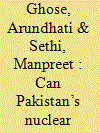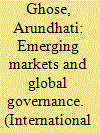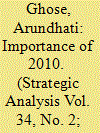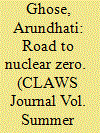|
|
|
Sort Order |
|
|
|
Items / Page
|
|
|
|
|
|
|
| Srl | Item |
| 1 |
ID:
138794


|
|
|
|
|
| Summary/Abstract |
Mark Fitzpatrick, a non-proliferation analyst at the International Institute for Strategic Studies (IISS) in London, is among the latest to hazard solutions to Pakistan’s nuclear dangers and myriad other problems. In his Adelphi book, Overcoming Pakistan’s Nuclear Dangers, he identifies four specific dangers presented by Pakistan’s nuclear programme: the potential for
nuclear use; for a nuclear arms race; for nuclear terrorism; and for onward proliferation and nuclear accidents. After an assessment of each danger, he proffers three recommendations, among them the ‘nuclear normalisation’ of Pakistan, defined as offering the country a nuclear-cooperation deal ‘akin to’ the one given to India in 2008.
|
|
|
|
|
|
|
|
|
|
|
|
|
|
|
|
| 2 |
ID:
101363


|
|
|
|
|
| Publication |
2010.
|
| Summary/Abstract |
China's emergence as an economic and military power has given rise to apprehensions globally, related not only to China's cultural and historical 'alienness', but also to its apparent willingness to challenge the global system and architecture of global governance. While non-Western countries are wary of the possible impact on them and on the global order of Chinese actions, they appear to be willing to cooperate with China on some global issues in order to change a system often seen as inequitable and unbalanced. Yet, the West seems to conflate the idea of a rising China with that of other emerging markets. Given their historical, political and cultural experiences, however, their access to power and influence, if and when it happens, need not necessarily take the same route as China. This is true particularly of India; India is likely, at least for the foreseeable future, to remain within the existing paradigm of global governance, though it may seek to adapt the rules and structures to better reflect its economic, political and security interests. This would not preclude cooperation on a selective basis on specific global issues with different partners, particularly in the realm of global challenges such as climate change, non-proliferation, international trade and finance and the global commons, such as space, the oceans and cyberspace.
|
|
|
|
|
|
|
|
|
|
|
|
|
|
|
|
| 3 |
ID:
094562


|
|
|
|
|
| Publication |
2010.
|
| Summary/Abstract |
In international relations, the more powerful have a way of underplaying history or overemphasising it, depending on how helpful or otherwise it may be in promoting their immediate objectives. It is interesting to note that even a country like India, which is beginning to sense the stirrings of power, is tending to fall into the same pattern. While this may be generally true, the expressions of power in the context of the non-proliferation of nuclear weapons, as becomes evident from an assessment of the five yearly Review Conferences of the Nuclear Non-Proliferation Treaty (NPT), have been more pronounced than perhaps in any other area of international relations.
|
|
|
|
|
|
|
|
|
|
|
|
|
|
|
|
| 4 |
ID:
073393


|
|
|
| 5 |
ID:
131023


|
|
|
|
|
| Publication |
2014.
|
| Summary/Abstract |
India-Japan relations are an important in?exion point, where we have, earlier, rarely had the opportunity of exchanging views on matters of strategic importance to both our countries, particularly in the areas of
nuclear disarmament, nuclear non-proliferation and nuclear weapons in general. Both India and Japan face threats of a nuclear nature, both overt and latent, yet have been at the forefront of supporting the cause of a world free of nuclear weapons. India is a nuclear-armed state, faces two nuclear armed neighbours with whom it has, if not hostile, at the least, adversarial relations, including territorial disagreements, while Japan, which is protected by a nuclear umbrella, also faces dangers from two nuclear armed neighbours. Yet, both countries appear to remain staunch in their support of Nuclear Zer0-the complete elimination of nuclear weapons. Both countries have often sponsored resolutions in the UN calling for nuclear disarmament, but, unfortunately, almost always, separately.
|
|
|
|
|
|
|
|
|
|
|
|
|
|
|
|
|
|
|
|
|